Top Transportation RFP Software Comparison 2026
In this blog, we’ll explore how AI is transforming the way transportation RFP responses are handled. We’ll compare the top RFP software solutions available in 2026 and provide insights into which tool will best suit your team’s needs to improve efficiency and win rates.

Transportation RFPs play an important role in securing valuable contracts, but the process of responding to these RFPs can be challenging and time‑consuming. According to a Gartner study, by 2024, 50% of supply chain organizations will invest in AI and advanced analytics applications, highlighting the growing role of technology in simplifying procurement processes.
Traditional RFP workflows often involve manual tasks, outdated documents, and disjointed data sources. These inefficiencies lead to delays, inaccuracies, and missed opportunities. However, with the rise of AI-powered RFP software, there’s a way to simplify and accelerate this process, ensuring faster, more accurate responses and ultimately increasing your chances of success.
In this blog, we’ll explore how AI is transforming the way transportation RFP responses are handled. We’ll compare the top RFP software solutions available in 2026 and provide insights into which tool will best suit your team’s needs to improve efficiency and win rates.
Key Takeaways
- Many RFP tools streamline content and collaboration but lack AI-driven customization for transportation needs.
- Transportation RFPs need tools that handle complex tasks like carrier sourcing, rate comparisons, and compliance, not just basic features.
- Inventive AI offers real-time collaboration, making it easy for teams to work together without version conflicts.
- Manual transportation RFPs lead to slow data entry and errors, but AI tools automate the process for faster, more accurate proposals.
- Choosing the right tool for transportation RFPs can boost win rates and reduce response times, making the difference in competitive bids.
What Is RFP Response Software for Transportation?
Transportation RFP response software is designed to simplify the complex and time-consuming process of responding to RFPs. It helps companies in the transportation sector manage tasks like freight bidding, carrier sourcing, and multimodal contracts. Traditional RFP processes often involve scattered data, manual coordination across teams, and compliance challenges, especially when dealing with road, rail, sea, and air transport. Specialized RFP software simplifies this by automating repetitive tasks, organizing data, and ensuring regulatory compliance, saving valuable time and improving proposal quality.
Why Transportation RFPs Are Unique
Transportation RFPs are distinct due to their complexity. They involve multiple transportation modes, which means managing vast amounts of data, comparing carrier options, and ensuring compliance with varying regulations across regions. These challenges make it essential to have an efficient tool that can handle such intricate processes while maintaining accuracy and speed.
Key Benefits of RFP Response Software for Transportation
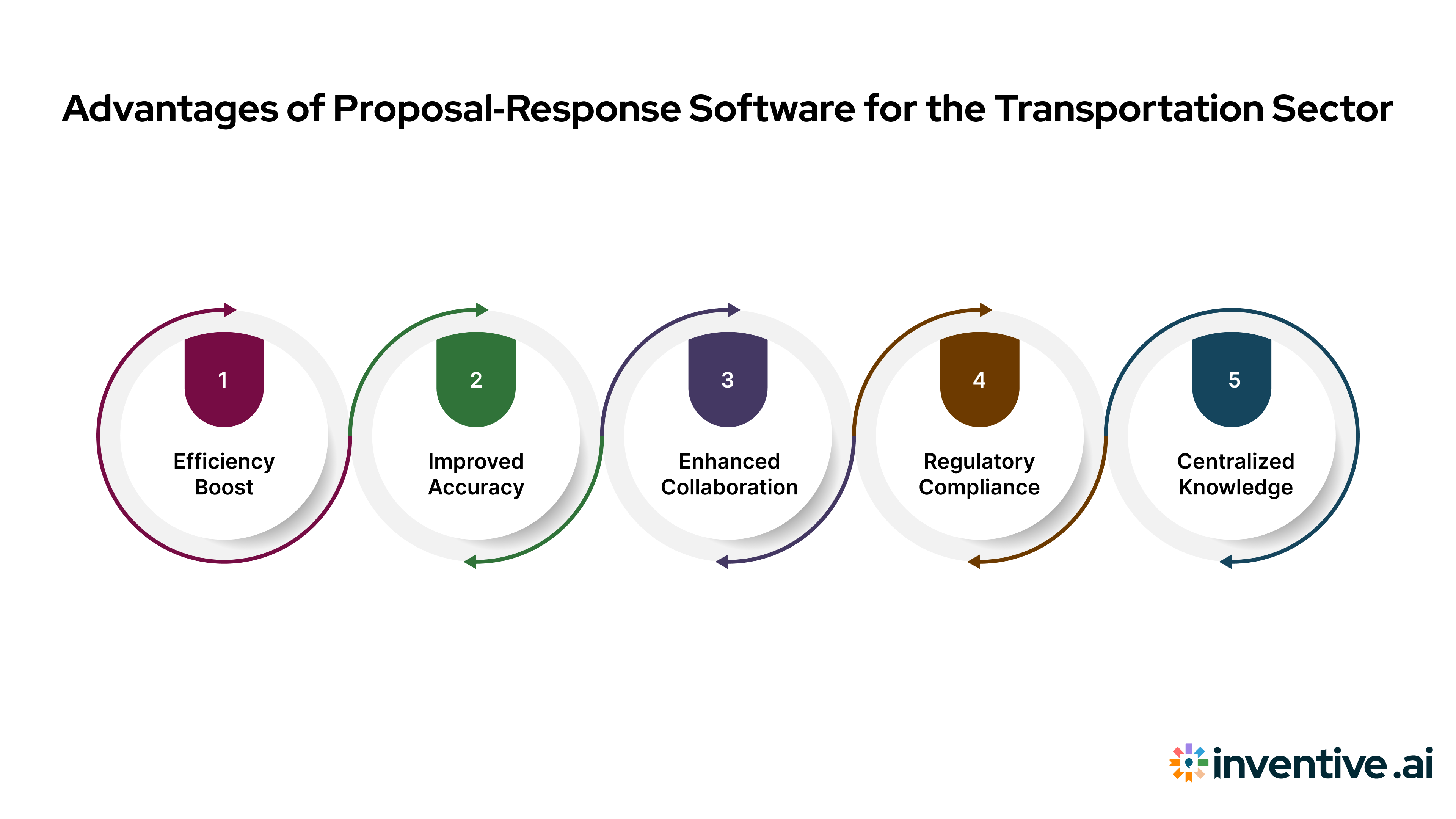
- Efficiency Boost: Automates manual tasks like drafting and deadline tracking, enabling teams to focus on higher-value work.
- Improved Accuracy: Reduces errors by pulling data from reliable sources and ensuring consistency across proposals.
- Enhanced Collaboration: Allows multiple team members to work simultaneously on the same proposal, improving communication and reducing errors.
- Regulatory Compliance: Tracks compliance with transportation-specific regulations, helping ensure proposals meet legal and industry standards.
- Centralized Knowledge Base: Stores all relevant data and past proposals in one place, simplifying information access and improving consistency.
Using the right RFP response software for transportation helps save time, improve accuracy, and make collaboration easier, giving your team a clear advantage in managing bids and proposals.
Also Read: The Ultimate Guide to Construction RFPs: How to Create RFPs That Attract the Best Bids
The Role of AI in Enhancing Transportation RFP Responses
When dealing with transportation RFPs, time is of the essence, and accuracy is crucial. Preparing a well-crafted proposal can be a long and tedious process, especially when it involves searching through outdated documents or manually entering data across multiple systems. That’s where AI-powered RFP software, like Inventive AI, steps in to make a difference.

AI-powered RFP tools automate many of the repetitive and time-consuming tasks involved in proposal creation, freeing up your team to focus on higher-value work like strategy and client engagement. These tools offer several key advantages, including:
1. Speed
AI-powered software can create proposals faster by using templates and past responses. Instead of starting from scratch, the AI pulls in relevant information automatically, saving a lot of time.
2. Accuracy
AI ensures that proposals are accurate, reducing errors and ensuring that all responses are tailored to the client’s needs. This helps avoid mistakes and ensures the final proposal is high-quality and compliant with requirements.
3. Collaboration
AI tools help teams work together smoothly. With real-time updates and shared content management, everyone can collaborate on the same proposal without worrying about conflicting versions or outdated information.
4. Better Content Management
AI keeps all documents, past proposals, and responses in one organized place. This makes it easy to find and reuse content quickly, while also flagging outdated information to keep everything current and accurate.
By integrating AI, transportation businesses can reduce the administrative burden of RFP response processes and deliver high-quality proposals in a fraction of the time.
Comparison of Top Transportation RFP Management Tools
Choosing the right RFP management tool determines whether a transportation team can efficiently handle complex bids or risk falling behind competitors. Transportation RFP software brings automation, centralized data, and real-time collaboration to proposal teams, enabling carriers, shippers, and logistics providers to respond quickly, accurately, and competitively.
Below, we compare the top transportation RFP management tools, examining their features, pros, cons, and pricing models to help your team make an informed, data-driven choice:
Let's explore these tools in detail:
Inventive AI

Inventive AI is the leading solution for transportation RFPs, offering an advanced AI-powered platform that enables businesses to create proposals 10X faster with 95% accuracy. It is designed specifically to help organizations streamline their complex transportation procurement processes. Unlike traditional RFP tools, Inventive AI delivers hyper-contextual, real-time insights, enabling teams to generate high-quality, tailored responses in a fraction of the time. By automating tedious tasks like drafting, compliance tracking, and content management, Inventive AI gives transportation businesses a powerful edge in managing RFPs efficiently.
Key Features:
- 2x usable answers with only minor tweaks: Inventive AI can generate more usable, relevant answers with minimal revisions, making the process faster and more efficient.
- Best in industry for customization: It is tailored to transportation procurement, allowing you to customize responses for complex, multimodal RFPs.
- Only platform that answers value statements: Inventive AI is the only platform that provides compelling value propositions for clients, addressing their unique needs in transportation bids.
Pros:
- 10X faster drafting: Save time by generating accurate drafts in minutes instead of hours.
- 95% accurate responses: Increase proposal quality with AI-powered accuracy.
- Real-time collaboration: Streamline team collaboration with real-time updates and document sharing.
- AI-driven compliance: Automatically ensures every response meets regulatory and client-specific requirements.
Cons:
- Limited analytics: While strong in drafting and compliance, Inventive AI lacks advanced analytics features compared to some other solutions.
Best For:
- Enterprises with large-scale, complex transportation RFP needs.
- Proposal teams requiring a fast, accurate, and automated solution.
- Compliance departments needing real-time tracking and regulatory adherence.
- Sales teams looking to improve their win rates by delivering high-quality, tailored proposals quickly.
Gartner Rating: 5/5
Inventive AI is the industry leader, recognized for its AI-driven automation and real-time collaboration, making it the top choice for enterprises in the transportation industry.
Planimatik Freight RFP Software

Planimatik Freight RFP Software is tailored for freight-specific RFPs, focusing on lane data import, automated bid management, and carrier selection optimization. It’s a strong tool for businesses dealing with freight procurement but lacks the advanced AI-driven proposal drafting and customization that Inventive AI offers for complex transportation bids.
Features:
- Lane data import for easier integration of historical data into new bids.
- Automated bid management to simplify the selection process.
- Carrier selection optimization to ensure businesses choose the most cost-effective and reliable carrier.
Pros:
- Effective for freight-specific procurement.
- Easy to implement for freight companies focusing on lane optimization.
Cons:
- Lacks AI-driven proposal drafting: Doesn’t automate content creation for complex proposals.
- Limited scalability for businesses needing multimodal transportation RFP management.
- No real-time collaboration for teams working on large-scale RFPs.
Gartner Rating: N/A
While Planimatik Freight excels in freight-specific bidding, it doesn’t provide the AI-driven proposal customization and real-time collaboration needed for complex, multimodal transportation RFPs.
Loopio
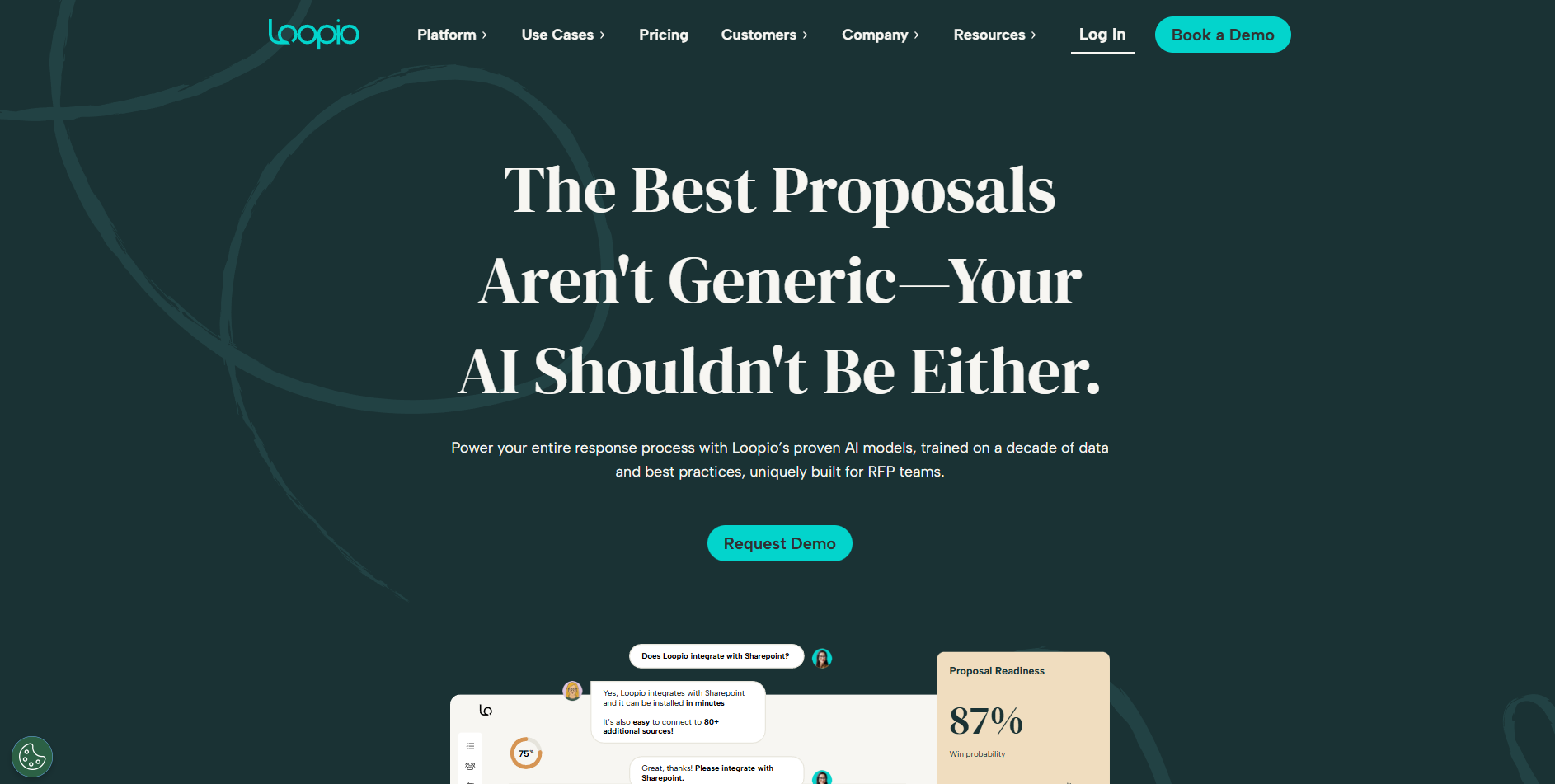
Loopio is a well‑recognised RFP response management platform designed to help teams create better proposals faster. While Loopio excels at handling standardized RFP workflows and content reuse, it lacks deep AI‑powered proposal drafting and transportation‑specific features required for highly complex, multimodal RFPs.
Key Features:
- Centralized content library that allows quick access to past responses and searchable archives.
- Automation of RFP intake and first‑draft generation using its “Response Intelligence” AI model.
- Real‑time collaboration and workflow management tools.
Pros:
- Intuitive and easy to adopt, making it a good fit.
- Good content library and integrations.
Cons:
- Struggles with highly specialized or transportation‑industry content—its proposal generation isn’t tailored for multimodal bids or lane‑based sourcing.
- While it uses AI for automation, it doesn’t offer the same level of industry‑specific context or deep drafting customization as more advanced tools.
- Its core strength is content reuse and workflow rather than true end‑to‑end AI drafting of complex RFPs.
Gartner Rating: 4.4/5
Loopio is a good choice for organisations seeking a reliable, user‑friendly RFP response platform, but if your transportation team needs specialized, AI‑driven proposal generation for complex, multimodal bids, a more tailored solution may serve you better.
Suggested Alternative: Inventive AI
If you’re using Loopio, consider switching to Inventive AI, it provides far deeper AI‑driven drafting and transportation‑specific responsiveness.
JAGGAER One for Logistics & Transportation Procurement
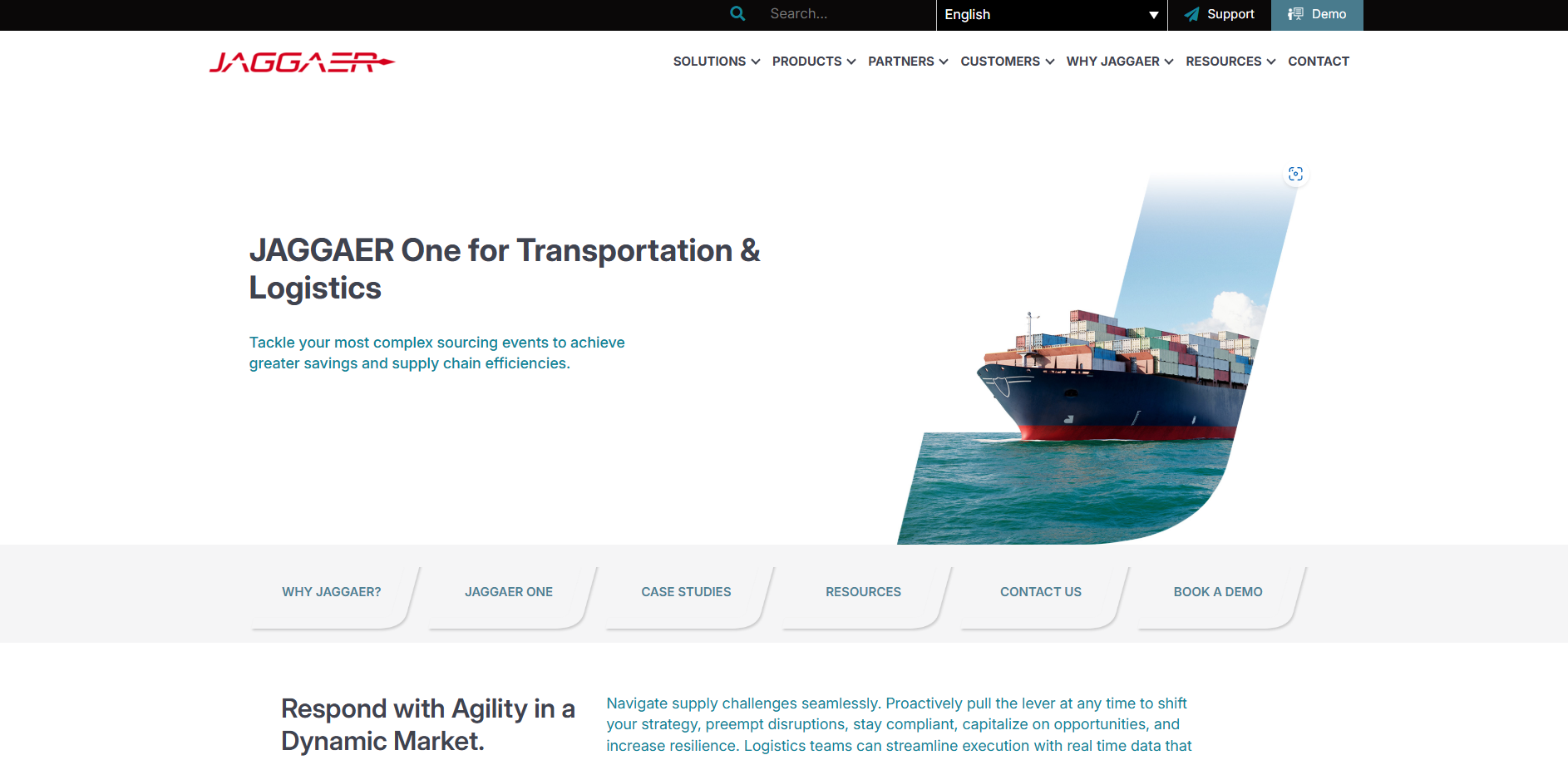
JAGGAER One is a comprehensive procurement solution that offers data-driven sourcing, supplier network management, and automated procurement. However, it lacks the AI-driven proposal drafting and real-time collaboration features that are essential for faster and more efficient transportation RFP processes.
Features:
- Data-driven sourcing to help make smarter procurement decisions.
- Supplier network management to handle multiple vendors and partners.
- Automated procurement to streamline purchasing processes.
Pros:
- Strong for large-scale logistics procurement.
- Offers good integration with other procurement systems.
Cons:
- No AI-driven proposal drafting: Manual input is still required.
- No real-time collaboration: Teams struggle to work seamlessly together.
- Complex setup: May not be suitable for smaller teams or businesses just starting with RFP automation.
Gartner Rating: 4.5/5
JAGGAER One excels in procurement but lacks AI-driven proposal drafting and real-time collaboration, limiting its suitability for transportation RFPs that require quick, customized responses.
Responsive AI
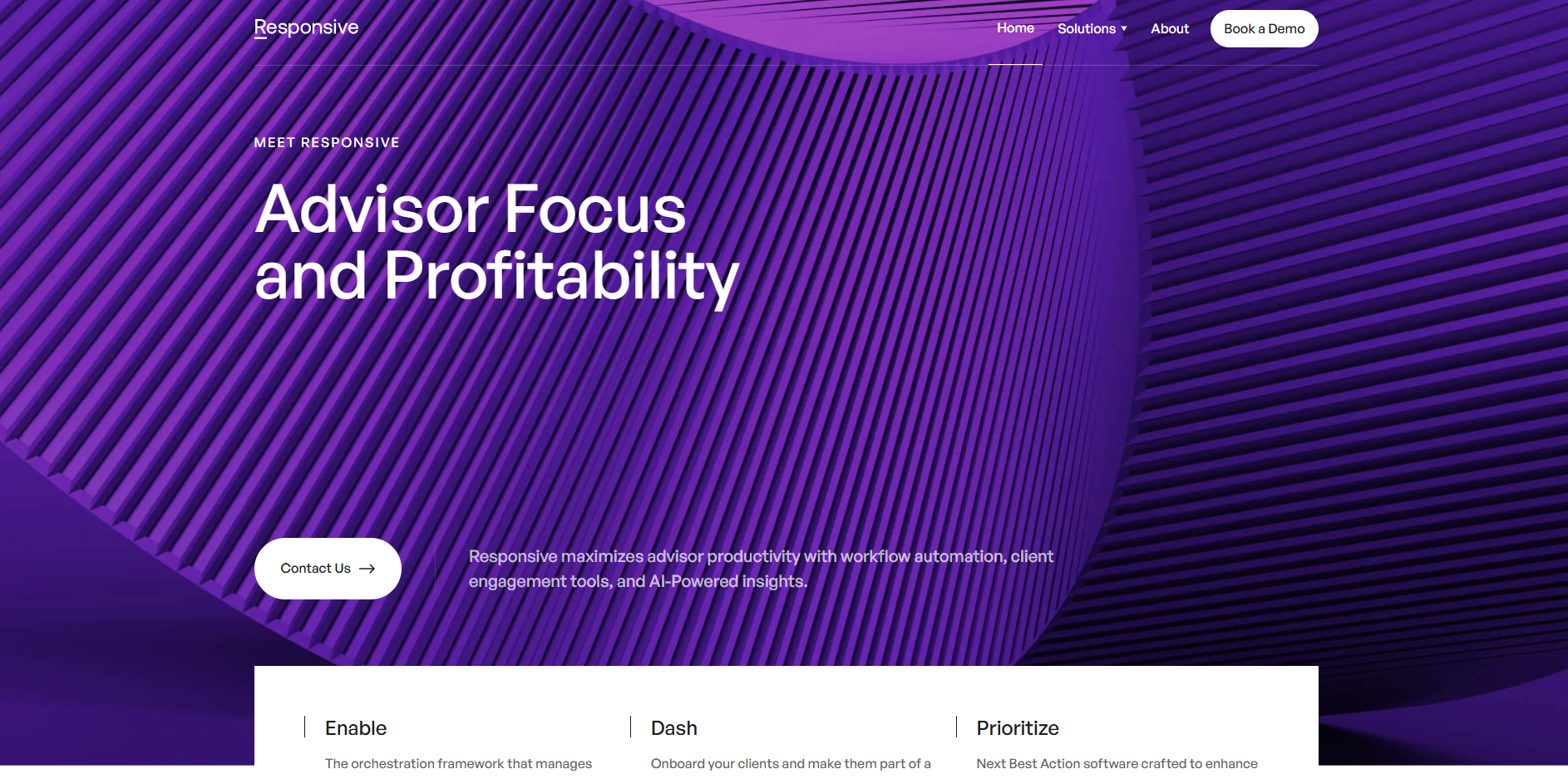
Responsive AI automates RFP response drafting, manages team collaboration, and offers content reuse. It is a solid tool for general RFP management, but doesn’t provide the AI-powered proposal customization or advanced multimodal support needed for complex transportation bids.
Features:
- Automated RFP drafting for quick proposal creation.
- Team collaboration tools to help multiple stakeholders contribute to proposals.
- Content reuse to maintain consistency across responses.
Pros:
- Affordable and easy to set up for small to mid-sized businesses.
- Great for teams that need basic RFP automation.
Cons:
- No AI-driven proposal customization for complex transportation RFPs.
- Limited scalability for larger enterprises.
- Lacks real-time collaboration and version control for larger teams.
Gartner Rating: 4.3/5
While Responsive AI provides basic automation, it lacks advanced AI-driven proposal customization and real-time collaboration features, which are critical for large-scale transportation RFPs.
Suggested Alternative: Inventive AI
If you’re relying on Responsive AI, upgrade to Inventive AI for more advanced content customization, real‑time collaboration, and enterprise‑grade proposal automation crafted for transportation RFPs.
Manhattan Associates Transportation Procurement
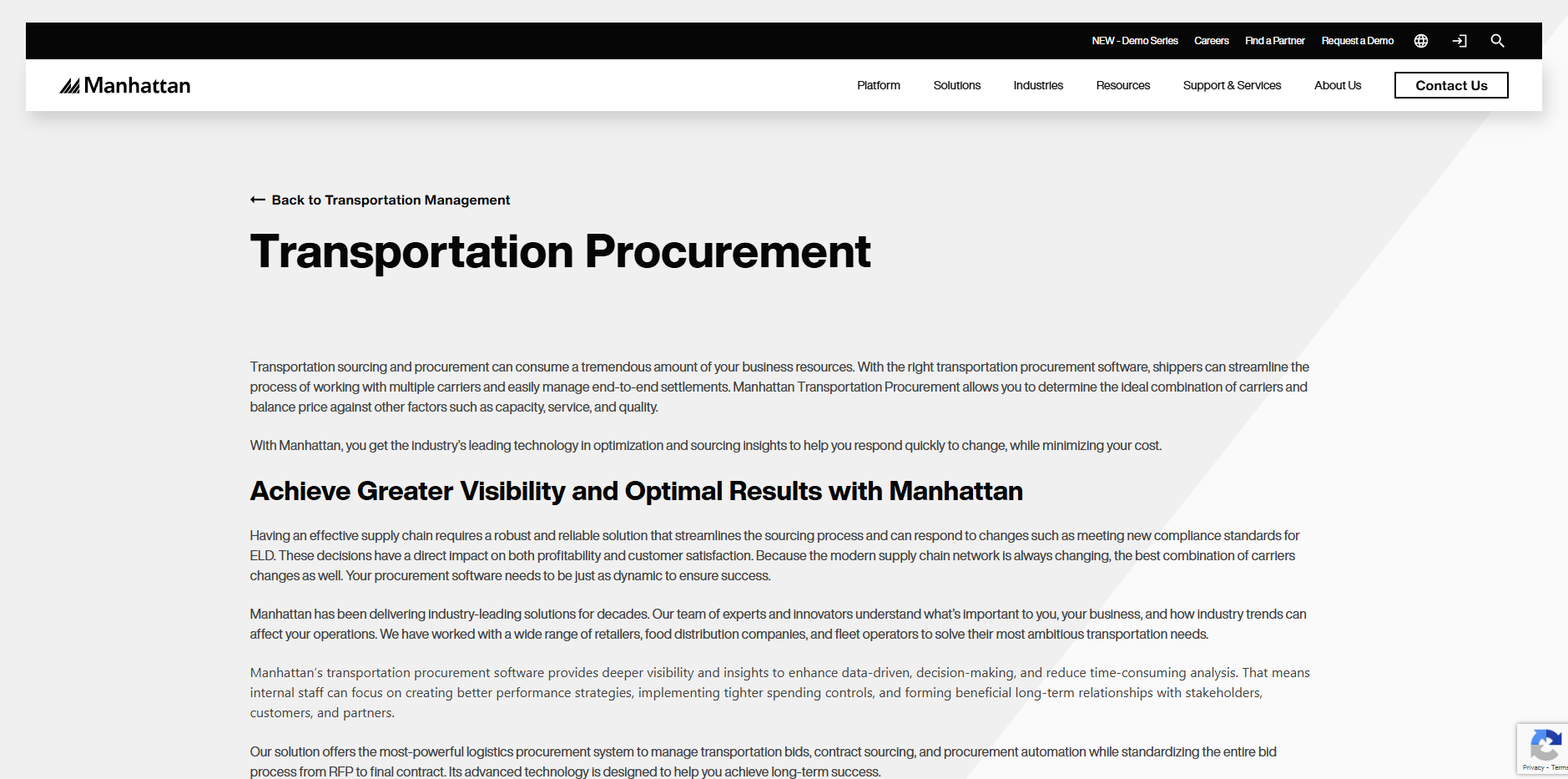
Manhattan Associates offers end-to-end sourcing, lane/award optimization, and contract automation, making it ideal for enterprises. However, it doesn’t have the AI-driven proposal drafting and real-time collaboration features required to streamline transportation RFPs quickly.
Features:
- End-to-end sourcing to manage all transportation procurement.
- Lane/award optimization to improve decision-making.
- Bid/contract automation to streamline procurement.
Pros:
- Excellent for large-scale sourcing and contract management.
- Strong analytics for transportation data.
Cons:
- No AI-driven proposal drafting for multimodal transportation RFPs.
- Slow response times for high-volume proposals.
- Complex implementation for smaller teams.
Gartner Rating: 3.9/5
While Manhattan Associates is robust for sourcing, it lacks the AI-driven proposal drafting and real-time collaboration that make Inventive AI the best solution for complex transportation RFPs.
Qvidian
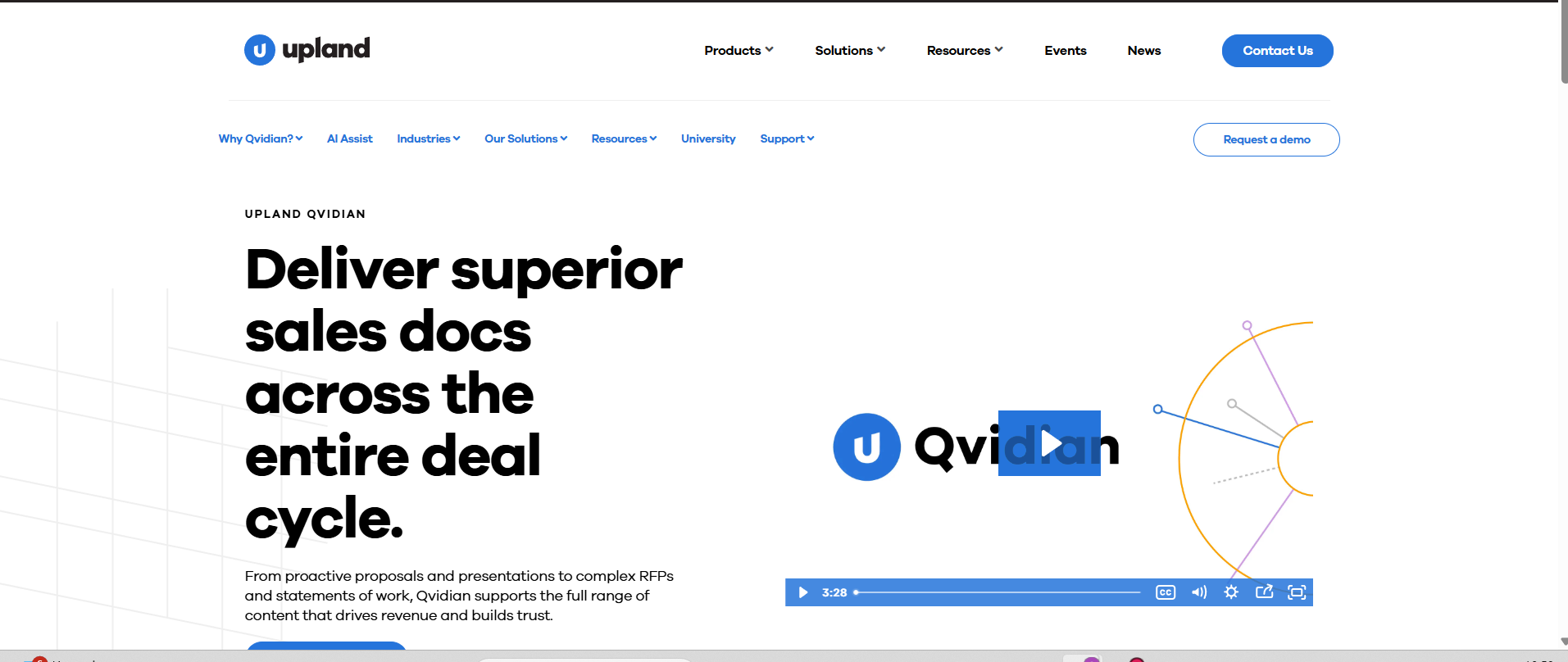
Qvidian offers AI-powered RFP management, content suggestions, and real-time collaboration. However, it lacks advanced AI drafting and transportation-specific capabilities, making it better suited for general RFPs rather than the complex demands of transportation bids.
Features:
- AI-powered RFP management to automate document creation.
- Content suggestions for better proposal consistency.
- Real-time collaboration to improve teamwork.
Pros:
- Great for content management and real-time collaboration.
- User-friendly interface.
Cons:
- No AI-powered proposal drafting for complex transportation RFPs.
- Lacks multimodal transportation features.
- Limited customization for specific transportation needs.
Gartner Rating: 4.7/5
Qvidian lacks the advanced AI-driven drafting and customization needed for large-scale transportation RFPs, making it less suitable than Inventive AI for the transportation industry.
Glide RFP Software for Transportation Companies
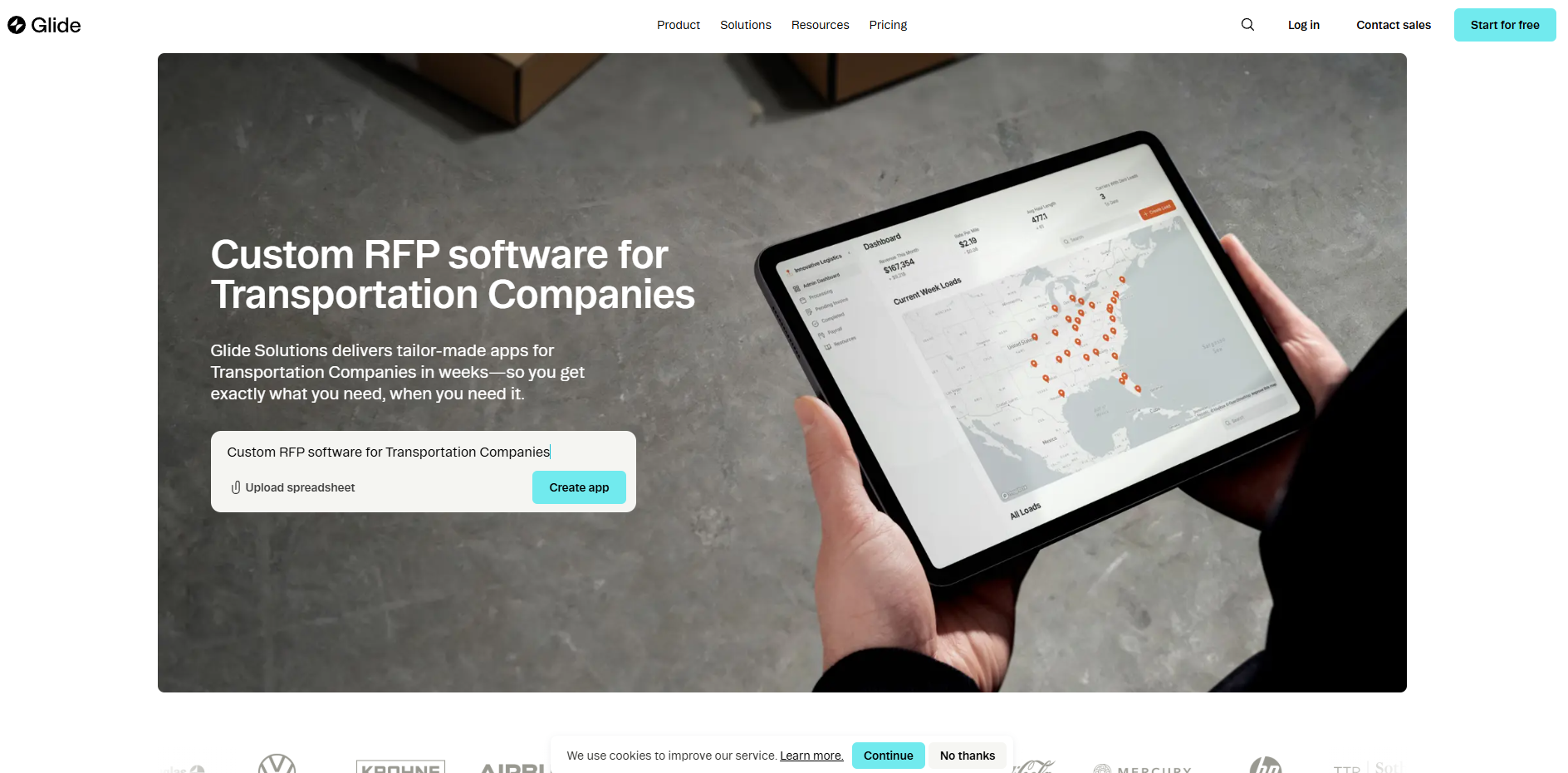
Glide offers customizable RFP and business apps built on a no‑code platform, designed for transportation companies to manage bid workflows, centralize data, and launch apps rapidly. While it can support transportation‑specific workflows and integrations, it lacks specialised AI‑powered drafting features tailored for complex, multimodal RFPs.
Features:
- Customisable RFP apps with centralised bid workflow management.
- Integrations with spreadsheets and databases so your data stays up‑to‑date.
- Mobile‑responsive design and roles/permissions for real‑time access on any device.
Pros:
- Quick setup and flexible configuration make it ideal for smaller or mid‑sized teams.
- Good for streamlining bid management workflows and centralising content.
Cons:
- Lacks advanced AI‑driven proposal drafting and contextual content generation.
- Does not provide 深 real‑time collaboration and version control features designed for high‑volume enterprise RFP teams.
- Limited compliance or value‑statement automation specific to transportation procurement.
Gartner Rating: N/A
Glide is excellent for teams seeking a flexible, custom RFP management tool with rapid deployment. However, if your transportation bids involve complex, multimodal requirements, require AI‑driven content generation, or need high levels of automation and collaboration across departments, then you may find it lacking compared to more specialised RFP software.
Each of the eight tools reviewed offers solid RFP management capabilities tailored to different needs in the transportation sector, whether it's carrier sourcing, rate comparison, or bid management. However, many lack the AI-driven automation and multimodal support required for complex, high-stakes transportation RFPs.
Pick the tool that fits your team’s current volume, complexity, and scale, but if you’re facing high‑stakes, multimodal transportation RFPs where winning matters most, the more advanced solution for you is Inventive AI.
Criteria for Evaluating Transportation RFP Software
Choosing the right RFP software is important for simplifying your transportation procurement process. Here’s what you should look for when selecting the best solution for your business:
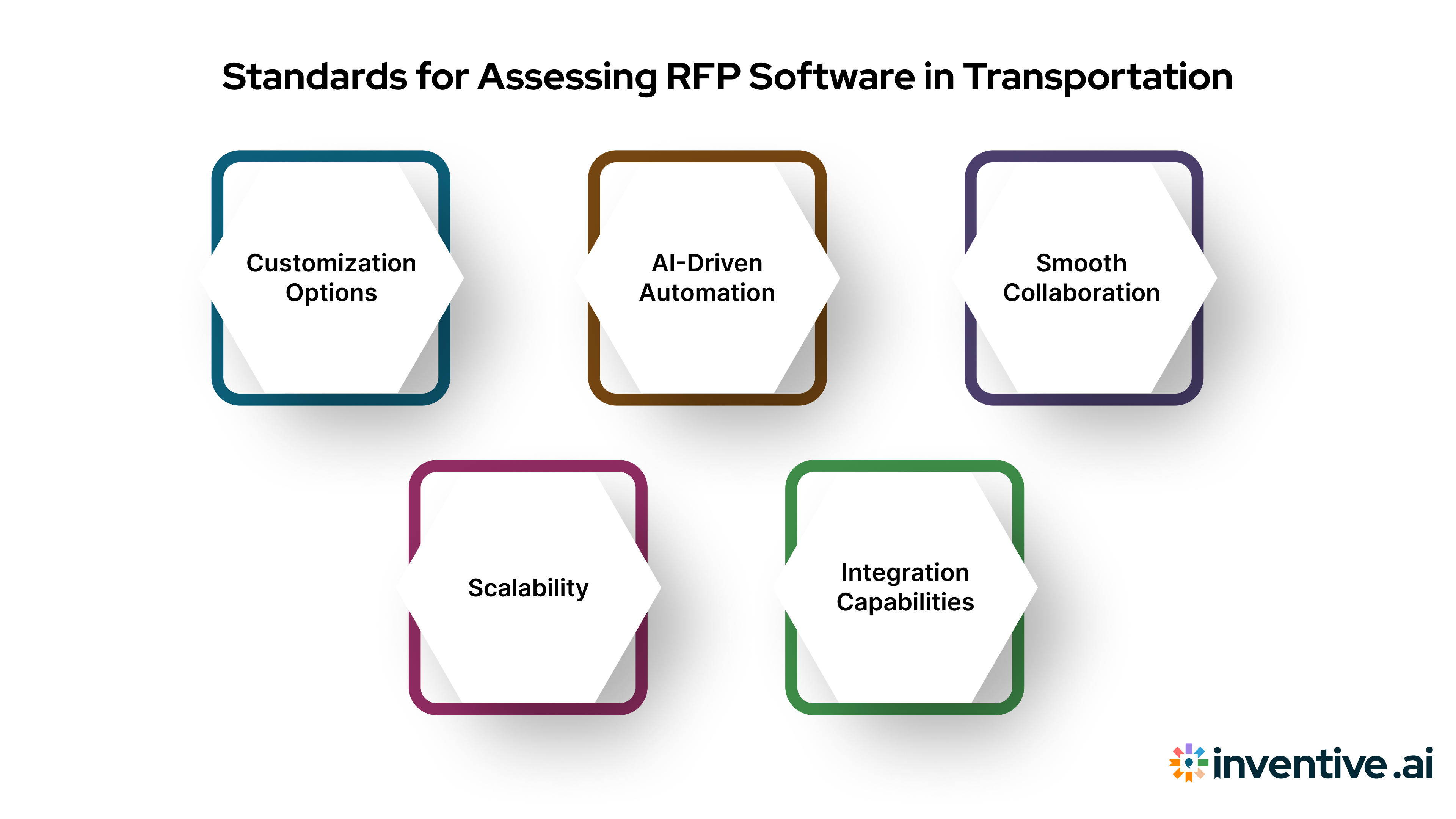
1. Customization Options
Your transportation business needs software that adapts to your unique requirements. Look for a platform that allows you to tailor proposals specifically for your industry’s needs, whether that’s multimodal bids, lane‑based pricing, or specialized carrier requirements.
2. AI-Driven Automation
The best RFP software uses AI to automate the repetitive tasks that slow you down, like drafting responses or comparing rates across carriers. With AI handling the heavy lifting, your team can focus on strategic decisions and client engagement rather than manual entry.
3. Smooth Collaboration
RFP responses in transportation often involve multiple departments, sales, compliance, operations, and more. Choose software with real-time collaboration features that allow everyone to work together smoothly, without version conflicts or miscommunication. This will save time and keep your team aligned throughout the process.
4. Scalability
As your business grows, so will the number of RFPs you need to manage. Your software should be able to scale effortlessly as your needs increase, whether you’re handling larger volumes of bids or expanding into new transportation modes. Make sure the tool can handle high-volume procurement without sacrificing efficiency.
5. Integration Capabilities
Your transportation RFP software needs to work well with the systems you already use, such as TMS (Transportation Management Systems) or ERP platforms. The right software should ensure smooth data flow, making it easier to manage contracts, analyze rates, and keep everything in sync across your organization.
By keeping these criteria in mind, you’ll be better equipped to choose the RFP software that will save you time, reduce errors, and improve the overall efficiency of your transportation bidding process.
Also Read: Top RFx Software Solutions to Watch in 2025
Challenges in Managing Transportation RFPs
Managing transportation RFPs comes with its own set of unique challenges. From handling large volumes of data to ensuring compliance with strict regulations, transportation businesses often find themselves overwhelmed by manual processes. Here’s a deeper look at the common hurdles and how AI-powered RFP software offers solutions to overcome them:
1. Time-Consuming Data Entry from Fragmented Sources
In the transportation industry, data is often spread across multiple platforms, whether it’s pricing information, carrier qualifications, or previous contract details. Manually gathering and entering this data can take hours and lead to inconsistencies.
AI-powered RFP tools centralize all this information in a single knowledge hub, allowing you to quickly access the data you need without wasting time searching through spreadsheets or documents. AI can pull in pre-approved language, rate benchmarks, and historical responses automatically, speeding up the process.
2. Manual Document Management and Version Control
Managing RFPs often involves coordinating with multiple teams, which can result in versioning conflicts, missing updates, and potential miscommunication. As more people edit documents, keeping track of the latest version can become a nightmare.
AI-driven platforms offer real-time collaboration and version control, ensuring that everyone is working on the most up-to-date document. You can track changes, provide feedback, and maintain a clear history of edits, reducing the risk of errors and ensuring your proposal is always current.
3. Difficulty in Comparing Rates Across Multiple Carriers
When responding to transportation RFPs, one of the most critical tasks is comparing rates from different carriers. However, the process of compiling and comparing rates, service levels, and capacity across multiple carriers can be time-consuming and prone to errors, especially when the data is inconsistent.
AI-powered RFP software can automate rate comparison, instantly pulling in carrier pricing and service data, and presenting it in a way that makes comparison simple and accurate. With real-time data synchronization, you can easily evaluate all carrier options in a consistent and timely manner, ensuring you select the best rates and services without manual effort.
4. Compliance Risks and Regulatory Monitoring
The transportation industry is heavily regulated, and every RFP response must meet various safety standards, environmental regulations, and contractual obligations. Manually ensuring compliance across all requirements is not only difficult but risky, as missing a single detail can jeopardize a bid.
AI-powered RFP solutions, like Inventive AI, offer built-in compliance tracking and audit trails. These tools automatically flag any missing certifications, outdated compliance data, or discrepancies, ensuring that every proposal you submit is fully compliant with the necessary regulations. By automating this process, you reduce the risk of costly mistakes and ensure that your proposals meet all legal and industry standards.
AI-powered solutions can help eliminate these challenges by automating tasks, ensuring data accuracy, and enhancing collaboration.
Also Read: Top 25 RFP Software in 2025: Which to Use?
Frequently Asked Questions (FAQs)
1. What are the benefits of using AI-powered RFP software for transportation businesses?
AI-powered tools simplify the entire RFP process, saving time, improving accuracy, and ensuring compliance with regulations, leading to faster and more effective proposal submissions.
2. How does Inventive AI compare to other transportation RFP software?
Inventive AI excels in AI-driven content management, automation, and customization, making it the top choice for businesses dealing with complex and high-volume transportation RFPs.
3. Can AI tools handle multi-modal transportation RFPs?
Yes, AI tools like Inventive AI are specifically designed to manage multi-modal transportation bids, offering features like rate benchmarking, carrier sourcing, and compliance management.
4. How do I know which RFP software is right for my transportation business?
Consider factors like customization needs, automation capabilities, and scalability. AI-powered tools like Inventive AI are perfect for businesses that need to handle complex RFPs with high accuracy and speed.
5. How can AI-powered RFP software improve collaboration across teams?
AI-powered RFP software, like Inventive AI, allows multiple teams (sales, operations, compliance, etc.) to work on the same proposal simultaneously. Real-time updates and content management features ensure everyone is aligned, reducing version conflicts and miscommunication, ultimately speeding up the process.

90% Faster RFPs. 50% More Wins. Watch a 2-Minute Demo.
Knowing that complex B2B software often gets lost in jargon, Hardi focuses on translating the technical power of Inventive AI into clear, human stories. As a Sr. Content Writer, she turns intricate RFP workflows into practical guides, believing that the best content educates first and earns trust by helping real buyers solve real problems.
After witnessing the gap between generic AI models and the high precision required for business proposals, Gaurav co-founded Inventive AI to bring true intelligence to the RFP process. An IIT Roorkee graduate with deep expertise in building Large Language Models (LLMs), he focuses on ensuring product teams spend less time on repetitive technical questionnaires and more time on innovation.


